Andrew Collins's Blog, page 33
August 20, 2012
The pop singer and my fear of the follower count

Feel my pain. Or at least, feel my bemusement and vague irritation. For the last week, I have been getting “followers” on Twitter who are – let’s say – very different from the “followers” I usually attract (by which I mean urbane, witty, self-aware 6 Music listeners; mums and dads; graphic designers; indie bands; stand-ups; comedy, film and music fans; you). I am more than happy to be “followed” by this familiar bunch; people I have clearly never met, but whose decision to “follow” me seems to be based on a generally benign, thinking person’s interest in the things I either do, or am interested in. I know how this shit works. It’s exponential. Once you are followed by a certain number of people, other people pick up on you and occasionally press the FOLLOW button. It costs nothing. It’s easily undone. And unless what I Tweet is entirely offensive to you, then unless you’re having a clearout, it’s just as easy to carry on following than not. I do not fool myself here. I’m old enough to take Twitter at face value. However.
An influx of what I will very carefully and gingerly descibe as fans of “the pop singer” (yes, that one, the one beloved of very young people whose name trends more than any other; him) has started to bother me. They’re not evil people, but I surmise that they should not really be following me. Why would they want to? What’s the connection? Every morning I find I have to weed them out, and block them, for their own good. It’s almost as if they are robotic followers, and not real people, but even if they are real, a cursory glance at their pithy one-line description (which will invariably involve hearts – which I don’t even know how to type! – and “xxxx” and “xoxo” and combinations thereof) and their recent Tweets (which mainly seem to be sent to other pop stars for young people, particularly a female pop star who wears funny outfits, or to “him”, entreating the recipient to “follow me back xxxx” or “follow me bak”, as they do not care for the English language) marks them out as aliens.
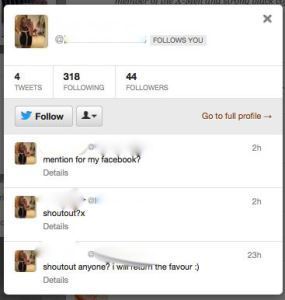
I do not profess to understand very young people. But sociologically, it’s sort of morbidly fascinating to see how their minds work with regards Twitter (a social networking service I use to communicate with other adults). They seem to be understandably deluded into thinking that if they Tweet either of the two pop singers mentioned, the pop singer will follow them back automatically. Hey, maybe this is the case. It certainly looks as if all they want is affirmation. A “follow back” is the ultimate prize. I personally couldn’t give a monkey’s who follows me or not. It’s their choice. I am happy to have them onboard, but I didn’t seek them out. The young fans of the pop singers seem to spend an awful lot of time begging to be followed, as if following was a meaningful act.
I have not mentioned the name of the young, male pop singer in a Tweet, either in satire, or in socio-cultural comment, otherwise I’d have an inkling why these tots have come out of the woodwork. Why am I a marked man? As I say, it’s a minor irritant having to dissuade them from following me – I even take the time to check who else they follow first, and if there’s an obvious trail of like-minded folk to myself, I give them the benefit of the doubt, otherwise, I fear “spambot” and block for self-defence – but the mystery is exercising my mind more than it ought.
I don’t wish insult anybody. But they won’t be reading this. There’s no reason for them to. But I currently feel as if I am being bitten by midges, electronically.
I Tweeted something which was intended to be amusing (but may not have been) after the Olympics Closing Ceremony, and, to my surprise, it was re-Tweeted by someone rather famous, who has more than two million followers. I have never to my knowledge had a pithy comment broadcast to that large a potential audience before, so I am now assuming that two-and-a-bit million followers is an impossible amount to police, and some fans of the young male pop singer may be among them by the law of averages.
Maybe that explains it. If so, I wish I could go back and not have that Tweet re-Tweeted. It would have been better for all of us.

Does anyone with a greater understanding of the technology under Twitter’s bonnet have any ideas? It’s not the end of the world, and in many ways, it’s an education, but I’d like to not have it happen again. I feel like I’ve inadvertently walked into the path of stampeding schoolchildren in a bad dream and I don’t have a lollipop stick.

August 17, 2012
Now, where was I …?
 Two weeks is a long time in television, although not so much when there’s an Olympics on. As you know, I made my own entertainment between the Opening and Closing ceremony, so it’s nice to get back in the saddle and review a few TV programmes again while looking into a camera. Telly Addict has never before been “off the air” (I had one week off last year and Guardian scribe Stuart Heritage filled in), so it feels weird, but here it is. I’m mostly talking about Celebrity Masterchef, back for its seventh series on BBC2; A History Of Art In Three Colours, a splendid antidote to all that cheering and winning on BBC4, with my favourite TV academic Dr James Fox; a nod to Friday Night Lights, season two – eek! – Sky Atlantic; and a glance at Jimmy McGovern’s Accused on BBC1. Next week, I shall be at the Media Guardian Edinburgh International Television Festival, so Telly Addict will act accordingly, by being filmed in the lobby of an exhibition centre in Edinburgh, with TV types wandering past in laminates, although there may be opportunity for other filmed delights. We shall see. Anything is possible after the Olympics.
Two weeks is a long time in television, although not so much when there’s an Olympics on. As you know, I made my own entertainment between the Opening and Closing ceremony, so it’s nice to get back in the saddle and review a few TV programmes again while looking into a camera. Telly Addict has never before been “off the air” (I had one week off last year and Guardian scribe Stuart Heritage filled in), so it feels weird, but here it is. I’m mostly talking about Celebrity Masterchef, back for its seventh series on BBC2; A History Of Art In Three Colours, a splendid antidote to all that cheering and winning on BBC4, with my favourite TV academic Dr James Fox; a nod to Friday Night Lights, season two – eek! – Sky Atlantic; and a glance at Jimmy McGovern’s Accused on BBC1. Next week, I shall be at the Media Guardian Edinburgh International Television Festival, so Telly Addict will act accordingly, by being filmed in the lobby of an exhibition centre in Edinburgh, with TV types wandering past in laminates, although there may be opportunity for other filmed delights. We shall see. Anything is possible after the Olympics.

August 10, 2012
Writer’s blog: Friday Pt 2
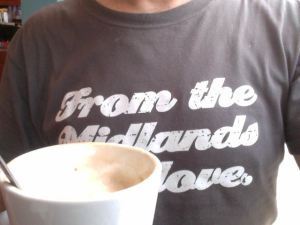
Day five Pt 2
Phew. Anyway, I’m in a local Caffe Nero, as I couldn’t face the commute to King’s Cross. (Hence: no commute soundtrack today, sorry.) As you can see, I’m wearing my “From The Midlands With Love” t-shirt, as it feels like a summer day, and because I am from the Midlands with love. This is a rare garment in my current wardrobe, as it has words on it. (I’ve long since stopped wearing “band” t-shirts, and in fact, rarely wear t-shirts any more, in a deluded bid for maturity. Maybe I would wear t-shirts if I was a “festival dad” but I don’t have that parental excuse!) The slogan refers to Miles Hunt and The Wonder Stuff’s ongoing, civic seven-inch covers project which you can read about here (and see some videos). I like the t-shirt.
Hmmmm … this just in. My sitcom Mr Blue Sky has not been recommissioned for a third series by Radio 4. I am a little shell-shocked by this bad news. Not that a third series was ever in the bag, but I foolishly allowed myself to become a little bit confident that there was more life in the show. (I had dared to dream; never a practical way to live your life.) They have given us many reasons why, which I won’t go into, but I’m sad not to be writing the stories I had planned for Harvey Easter and his family, which I thought were rather promising. We’ll still push for it on TV, of course, but I feel too winded to contemplate the practicalities of that right now.
Working in TV and radio, and the media in general, is not for the faint-hearted. You win some, you lose some, and you cannot allow the losses to get you down. (We won when Radio 4 were kind enough to commission Mr Blue Sky in the first place, and to support it through two series and ten episodes, so I’m calling that a result.) You get knocked down, you get back up again. You pitch something else, to someone else, and keep banging on doors. Hey! Gates starts on Sky Living next Tuesday. Maybe it will be well received and we’ll get a second series of that. Maybe this script I’m writing right now will be commissioned. Maybe the meeting I had in the Groucho will develop into a project. I will say it’s been a tough summer for work, what with Word closing down as well, although that was as much a loss for British culture as it was for my accountant, and must be kept in perspective. I am putting on a stoic, determined expression. Do you want to see it?

Well, the beauty of working near your house is that you can go home for your lunch, rather than cart it around with you, as I normally do. I rather skilfully remixed the last portion of this week’s chilli with the first portion of my latest soup. A thrilling mash-up, it picked me up a bit when I needed it. I am now back in a coffee shop, but a different one, where I am nowhere near a window but very near a wall-hanging of something Italianate and esoteric. (I resent the dominance of Caffe Nero in my working life, as they charge extra for soya milk, which is a scandal, but they do offer wi-fi, which clinches it every time, and their loyalty card is – I think – the most generous of all the chains.) I am trying to look melancholy in this pic, but I’m not very good at it. I have a beautiful smile, ordinarily, which is key to my athletic prowess, but I haven’t been using it in these diary pics, as who wants to sit and smile at their laptop in public?
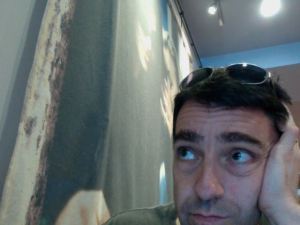
Incidentally, my “commute” is today a very short bus ride, so I only had chance to listen to a couple of songs. Here they are, in case you’re interested:
CEREMONY Hysteria (single version)
WE ARE AUGUSTINES Juarez (album version)
ZEBRA AND SNAKE Money In Heaven (Kashi Remix)
DEAD FLAMINGOES Habit
MR FOGG Stay Out Of The Sun [partial, as I arrived at my destination]
These songs, by reasonably arcane artists, come from an ongoing playlist I imaginatively call 2012 New Singles!, which I build up every time I’ve emptied my pigeonhole at 6 Music. I like to keep up with the new music, and these selections have been quality-stamped and filtered out of the general swamp of newness.
Incidentally, I’m back on 6 Music next Saturday, August 18, and then again on Saturday September 1. Just two floating Saturdays in Jon Holmes’ 10am-1pm slot, but it’s been good fun the last two times. I have no idea what’s happening with that slot in the long term, so don’t ask me.
I might let the diary go now. It’s been a blast, as ever. Sorry so much of it has been me ranting, and the rest of it me not being able to specify what I’m actually working on, but I think my writer’s block has been alleviated a bit. I have certainly written some script this week. Finding out that another project has just bitten the dust is always potentially harmful to one’s concentration, but even after the Mr Blue Sky bombshell, I’ve been able to at least cut loads of stuff out of the latest draft of The Script That I Cannot Yet Name for the broadcaster I cannot yet name.
Actually, I had to cut the aforementioned “font joke”, so I may as well copyright it here. “I used Arial Bold – I wanted to make a clean start.” Don’t you dare nick that. I have witnesses.
I fully intend to drink a cold beer this evening to commiserate with myself about the end of the road for Mr Blue Sky, a project that was very dear to me, and I shall be toasting all those who helped make the two series we made for Radio 4 such a joy from one end to the other, including both critics and Tweeters who were so positive about it. In the meantime, I’ve just had a call from my old pal Simon Day (who was, of course, in Mr Blue Sky) about something else that may or may not be nearing the pipeline, so fingers crossed, and enjoy the remaining days of the Olympics. You all have beautiful smiles.
Telly Addict returns next Friday. I shall be mainly reviewing Celebrity Masterchef, The History Of Art In Three Colours and The Great British Bake-Off.

Writer’s blog: Friday Pt 1
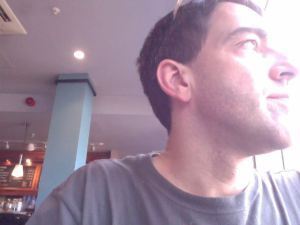
Day five Pt 1
I am mentally exhausted after last night, and need to get this out of my system. I did watch the famous runner Usain Bolt easily win the 200m, and I loved the fact that Jamaica won silver and bronze, too. Nice grouping. I was, however, part-impressed, part-horrified that the BBC made a short film about the burning issue of whether the dominance of black athletes in running is about genetics or eugenics. This film took in slavery, Hitler and Darwin, and was intended as a talking point. However, I think John Inverdale handled the ensuing studio discussion – with grumpy Michael Johnson (who made a doc for C4 on the same subject), noncommital Colin Jackson and diplomatic Denise Lewis – really badly, almost as if it was his mission to get a black person to say, “Yes, all black people are alike.”
Was this really the time to have this thorny discussion, BBC? In the build-up to the much-hyped 200m final? It would be churlish to ignore the visibility of black athletes in these events (only one white finalist, a Frenchman), but the debate about genetics versus environment, nature versus nurture, is way too complex to bat around in a studio in a couple of minutes. Johnson seemed to become more and more entrenched behind “nurture” in the face of Inverdale’s evangelism for “nature”, and I must admit I came down on Johnson’s side, for all his over-seriousness. Meanwhile, Lewis wisely threw in climate as a factor. Africa, the West Indies, these are hot countries, and warmth has an effect on muscle; also, it’s self-pollinating – when a country becomes known for certain sports, there is a culture in that country for that sport to be taken up.
As I say, not a quickie for filling time in the studio. Never mind the science; it’s always a potentially reductive argument to say that certain traits are specific to black people, or white people, or indeed to men or women. Black people had to play the minstrel or the butler for decades before civil rights evened up the playing field. If most of the best soul singers are black it’s not necessarily because of genetics, but it could be argued that it’s deeply rooted in the blues and the experiences of slavery. From that starting point, it’s surely the culture of soulful expression that breeds further soulful expression. (How many great soul singers learned to sing in church? That’s not genetic. That’s environmental and social.)

Let’s move on to sexism. This is much easier to treat as a black and white subject than black and white, as the genders are much more clearly defined. At the end of his interview with Olympic gold medal-winning boxer Nicola Adams – women’s boxing’s first ever – Gary Lineker complimented her on her “beautiful smile.” It was his sign-off to the interview, and I’m sure, in the split-second heat of the moment, his brain told him it was a perfectly legitimate thing to say. He lightheartedly congratulated her for not crying like so many other medal winners, male and female, and applauded her for smiling – that’s the context. “You’ve got a beautiful smile,” he said, as a compliment, perhaps unaware that he was not judging a beauty contest. Hey, she has got a nice smile. But she was not being interviewed about her smile, rather, about her amazing prowess in a sport this is only now finally achieving parity within a traditionally male-dominated sport. As such, at such a sensitive moment in the history of women’s liberation, “You’ve got a beautiful smile” made me squirm in my sofa.
Would he have said this to a male athlete? I think not. Would Gaby Logan have said it to a male athlete? Or a female athlete? I think not. It came across as patronising, passive-aggressive and … to use an old-fashioned term … sexist.
Even by writing the word “sexist” down, I realise I sound like a fossil from another century. But casual sexism – the sharp end of which is the abuse and oppression of women, domestic, religious and institutional – has not been eradicated, any more than racism has, or homophobia, or xenophobia, despite great strides in the West and elsewhere.
These were the issues we worried a lot about in the 80s, although by the 90s it had become fashionable to be sexist again. I never bought it. The values I built up over the course of the 1980s have stayed with me. I do not apologise for that.
I Tweeted about Lineker’s sexist remark, and found myself having to debate the matter with people coming at me from all directions. I did my best to reply to the replies that merited a reply, and in many cases found myself in parallel dialogues with all sorts of people I have never met. Many simply concurred. That gave me strength that the fight against sexism is not totally forgotten. The majority of challenges came from men, unsurprisingly. This, in precis, is how the counter-argument ran:
Nicola Adams has got a beautiful smile.
I never said she hadn’t. If I sat at home and commented, “She’s got a beautiful smile,” that would be a perfectly valid observation to make; a subjective one, but valid. I wouldn’t say it to her, necessarily, unless its intention was absolutely understood and we knew each other well. Meanwhile, if I was a powerful, well-paid, well-known male BBC anchorman interviewing Nicola Adam for an important post-win live broadcast on a sports programme about her sporting achievement, I would never comment upon a physical attribute that had nothing to do with that achievement. She does not box with her smile. (Someone said that Clare Balding has commented on Chris Hoy’s thighs; firstly, I bet she didn’t do it to his face; and secondly, his thighs are absolutely intrinsic to his sporting achievement, so you could justify it in any case. We’re allowed to appreciate the physical appearance and attributes of others; this is not about thoughtcrime, it’s about how we express ourselves and what we say out loud.)
Context is key. Women’s boxing is an Olympic sport for the first time in 2012. That’s historic. Nicola Adams is GB’s first medal-winning female Olympic boxer, and the first Olympic gold medalist in the sport ever. She is historic. She is a powerful sportsperson, and, you might argue, an even more powerful sportswoman. Boxing federations have fought hard (ha ha) against women’s boxing being regarded as equal to men’s. I don’t even like boxing, but if men are allowed to punch each other for sport, then so should women be. It strikes me as subtly patronising that women are allowed to box like men, but are still expected to fight shorter rounds (four rounds of two minutes, as opposed to three rounds of three minutes for men), but one assumes this might even out in time. Since you ask, yes, I also think it’s bizarre that women play fewer sets in tennis. Women had to fight to get equal prize money in tennis and were quite prepared to play five sets in order to achieve that at Wimbledon, but the tennis federation left it at three sets. Hey, don’t want Wimbledon to go on too long, do we? Get the women’s matches out of the way quickly and bring on the men. (Anybody doubt that the Williams sisters could go five sets? Or beat the men?)
I’m not much of an expert on sport, as you know, so please correct me if I’m wrong, but women’s football matches are played to 90 minutes, right? (Another victory for women at the Games.) And so it should be. Women should surely be allowed to do the decathlon, too. Institutionalised sexism is all around us, never mind in sport – equal pay, anyone? – so it’s not missing the issue to get upset about a boorish remark made by a male TV presenter to a female athlete. (It was as if this woman in front of him was so powerful, he felt some subconscious urge to attempt to reduce her to a lovely smile.)
I’ve had some vexing responses to my arguments on Twitter, too. One person told me that I am “part of the problem” and that “the media” are too quick to brand someone sexist or racist. (This smacks of the Daily Mail‘s feverish fantasy about “the PC Brigade”.) I’ve also basically been accused of being a killjoy and a sourpuss and been advised to celebrate the fact that a man has complimented a lady. (One Tweeter, female, said, “It is a terrific smile: there has been a fair bit of smile coverage over the Games. Try it yourself!” – which is the reverse-equivalent of a builder on some scaffolding shouting out to a fetching lady, “Cheer up, love!”)
Well, I’m old enough not to worry about being regarded as a grump, or a fossil, and I’m afraid I’m sticking to my guns. The “isms” must be policed, by all of us, wherever they are found. Just as apartheid, segregation and ghettoisation are the logical conclusion of unchecked casual racism, casual sexism points us back at Victorian times when men smoked cigars in the drawing room and talked about politics while the ladies sat around sewing. But had beautiful smiles!

August 9, 2012
Writer’s blog: Thursday

Day four
I forgot to publish my commuting soundtrack yesterday. It actually accounts for the commute in and out:
50 CENT In Da Club
WILSON SIMONAL Não Vem Que Não Tem (Nem Vem Que Não) [not 100% sure of the details but it's from the City Of God Remixed album]
SIOUXSIE & THE BANSHEES Switch
SONIC YOUTH Catholic Block
SPARKS No.1 Song In Heaven
THE VERVE Love Is Noise
YEASAYER Ambling Alp
SPEAR OF DESTINY Never Take Me Alive
THE WOODENTOPS Well Well Well
POP WILL EAT ITSELF Get The Girl! Kill The Baddies!
PLAN B No Good
YOUNG DISCIPLES Apparently Nothin’
WU-TANG CLAN Intro (Shaolin Finger Jab/Chamber Music)
YEAH YEAH YEAHS Heads Will Roll
WU-TANG CLAN Bells Of War
SONIC YOUTH Against Fascism
TALKING HEADS This Must Be The Place
SANTOGOLD L.E.S. Artistes
PSYCHEDELIC FURS Into You Like A Train
TING TINGS Great DJ
SIOUXSIE & THE BANSHEES Red Light [lots of Siouxsie yesterday)
THE TWILIGHT SAD The Room
TALKING HEADS Born Under Punches
SUGAR JC Auto
TV ON THE RADIO Wolf Like Me
Phew. Made two hot, crowded Tube journeys in inappropriate long trousers a whole lot easier.
Incidentally, I was wearing long trousers on a short trousers day because I had a meeting in the middle of the day yesterday at the Groucho Club. As usual, I am unwilling to reveal which media luminary I was meeting there, as it was the first time we’d met and it may one day evolve into a “project”, which I must not jinx; suffice to say, I very rarely cross the threshold of this or any other private members-only Soho media watering hole, and such, it’s always a tiny thrill.
I have never been a member of any club that charges a large amount of money for me to be a member of it, even if the club would have me as a member. (The gym is the closest I’ve ever come, and I haven’t been a member of one of them for four years.) I’ve been in the Groucho as a guest on a number of occasions down the years, and had some media fun in there, but I once met a powerful media figure there while I was off the booze and the media figure was so disgusted that I wouldn’t take an alcoholic drink I genuinely fear the evening cut off a whole avenue of work for me in the future. It appears to be a social club, but it is in fact a series of meetings, even after hours. I spent a happy evening watching a World Cup game in the upstairs bar with genial Inbetweeners co-creator/writer Iain Morris in 2010. And after a big 6 Music/Radio 2 Christmas bash when such things were allowed, Rowland Rivron got about 20 of us in as his guests and would not let anybody pay for anything. That felt like a definitive Groucho Club experience, with the definitive Groucho Club host.
Anyway, I had two coffees and it was a very promising meeting indeed. You wouldn’t want to go in there in shorts, even on a hot day, although I expect Keith Allen has been in there with his top off during his pomp.
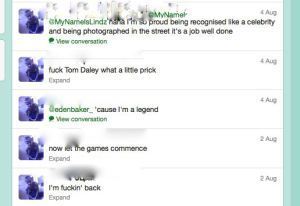
Now, I deleted my mentions of Tom Daley’s Twitter troll from Twitter yesterday, as by even mentioning this damaged individual on his favourite forum risks glorifying his actions further. As you can see, I even smudged out his @Twittername in the grab I made. (Anyone who has cared to follow this obnoxious story will know that he’s @Rileyy_69 – which seems safe to mention within the unsearchable sancity of this blog entry – but I sincerely urge you not to visit his feed.) He seems to have been released by Dorset police after his malicious Tweets to Daley, although I understand a whole litany of previously offensive Tweets, some of them overtly racist, are still to be investigated. But if he’s under caution at all, he really ought not to be broadcasting on Twitter. And yet, he is, and full of himself. He’s obviously proud of being “famous” and “a legend”, and of putting on over 30,000 new followers since he entered Daley’s radar, and he’s in fact back to insulting Daley, albeit not using the diver’s @Twittername this time. So he has learned something.
I know I appear morbidly fascinated by the story, but it’s not about him as an individual – he’s only 17, lives alone in a bedsit, and was said in a Daily Mail report (which contained an interview with his despairing, hand-washing dad) to have a form of ADHD that he is not being medicated for. (The Mail piece also had an erection about the fact that he’s “on benefits”, but that’s irrelevant.) I’m not sure why Twitter haven’t suspended his account – all of his original offending Tweets are still up, and the racist ones before those. They were quick to suspend the account of Guy Adams of the Independent. Maybe if Rileyy-69 had insulted a corporation he’d have been in more trouble.
Anyway, to happier matters. I was so taken with the new Radio Times office – much more agreeably air-conditioned than the shed in White City, and laid out with geometric efficiency unlike the old jumble, such that it might be mistaken for the Washington Post – that I chose to come back here today, rather than trek to the Library. I still have vouchers for the coffee bar, too, which clinched it.
Maybe the stars are aligned for me today: just saw a Tweet from the British Library saying that it’s closed due to a fire alarm. Thank you, random swirl of the universe.

Oh no! Came home early (in order to make a soup with the chicken stock I made yesterday, of which more presently) and found the new New Yorker on the mat. Disaster! I’m still two whole issues in the red. These two, if you’re following the saga:

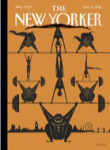
The new one looks terrific, with a piece on the Olympics so far (Medals and Marketing by Ben McGrath) which promises to be wise and analytical; a profile of Imran Khan (Sporting Chance by Steve Coll, a man you can trust on geopolitics); and a piece by lively TV critic Emily Nussbaum (who seems to have replaced lively TV critic Nancy Franklin) on Big Brother‘s 14th “season” on CBS. I’ve already read David Denby on The Bourne Legacy, as I always read The Current Cinema first, because it’s only ever two digestible pages long. It’s my treat. How I’m going to resist tearing into the meat and potatoes of this new issue before I’ve finished the previous two, I do not know. “First World Problems”, eh?
I hate the Twitter hashtag #FirstWorldProblems. It’s intended as a knowing admission of bourgeois hand-wringing for those with missionary guilt and is applied to the end of a mundane gripe. Fine. If you must. What it isn’t for is to apply to someone else’s Tweet, as a touché. Someone, now blocked, did this to me when I Tweeted about not being able to decide which biscotti recipe to try off the internet. I’ll be the judge of whether this is a #FirstWorldProblem, thanks. And I judge that it is not, as I do not recognise the First, Second and Third World rubric. It’s an outdated Cold War precept, and for me, has the nasty tang of colonialism, to designate an implicitly noble and authentic part of the world as “third”, where problems are more, like, real, man. We all understand the disparity between rich and poor nations, fully industrialised and rural economies and all points in between, but it’s not as simple as a league table. To even point out a #FirstWorldProblem is a #FirstWorldLuxury, so stop it. Good, glad to get that off my chest.
The soup, since you ask, is another jazz recipe which I made up as I went along: the gorgeous chicken stock (made from a carcass and some onion and celery) was added to a pan in which some spring onion, more celery, courgette and previously blanched green cabbage had already been softened in oil. I ground up some cumin and coriander seeds, too, and threw in one and a half chillies, as is my wont. It smells bloody lovely, simmering away there on a hot evening, while a Perroni speed-chills in the freezer. For me, this soup is all about stretching a chicken that has already provided two meals into at least two more, and uses up some of the less glamorous vegetables before they pass their peak. Clearly, it would work with vegetable stock.
Someone suggested on Twitter than I start a food blog. Would that I had the time. I don’t even have time to do this. I started it to help with my writer’s block and I’ll see it through to tomorrow, Friday, but it was intended to help me write this – pardon my language – fucking script, and not replace it! (The fucking script is moving in the right direction, which is: three steps forward and two steps back. That’s winning.)
I predict an evening of eating, drinking and watching either another foreign film on DVD in the kitchen, or some token Olympic action when the famous person Usain Bolt runs in something important.

Writer’s blog: Wednesday
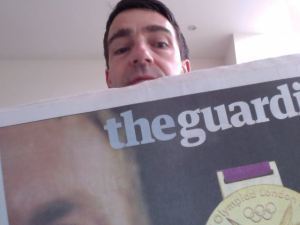
Day three
Each day I walk to the local shop to get the paper. I like this walk. I pick up the obvious paper, as it is my paper, and I spend a while gazing at the other papers, which are helpfully arranged so that I can see their covers. It’s always an enlightening way of taking the temperature of this great nation of ours, with the Mail frothing about something that signifies that rationing has sadly ended, the Express literally talking about the weather, the Sun and the Mirror and the Star shouting about a minor indiscretion among the celebrity class, the Independent doggedly restating its independence by highlighting an uncool issue, and so on. Not these past two weeks: every cover story has been the same.
It’s odd to see the whole gamut of daily newspapers covering literally the same basic story, every day. Big pictures of smiling or grimacing athletes abound, assorted puns on keywords like “gold”, “medal”, “Hoy” etc. Is this really the united nation it gives every appearance of being? If so, what’s going to happen after Sunday? Who will we cheer? What will we do with our cape-sized Union flags? What will we watch on the telly? What will the newspapers write about? What will the commentators commentate on? How will we maintain this unification of optimism in the face of cold, hard reality? It could be quite a comedown.
Anyway, GOLD!!!!!!!!!!
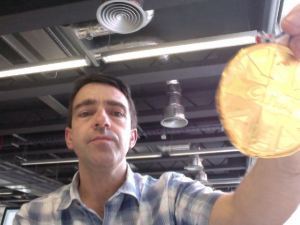
As you can see, I won an Olympic gold medal today. It was a chocolate one, but I sort of won it, as I didn’t pay for it. I found it in the “welcome pack” at my new office. It isn’t strictly my office, it’s the new office of Radio Times, where I go to work once a week, as I have done for many years. (Just as, when I was a kid, Thursday was the day my Nan came round, Wednesday is the day I go round to Radio Times.) This used to mean going to a building owned by the BBC, when the BBC owned BBC Magazines, but the BBC had to sell BBC Magazines, along with some of its buildings, when the Murdoch government negotiated the Licence Fee to stay the same until 2016. Radio Times is now published by Immediate Media, who had to move us from the BBC building to a new one, which is in Hammersmith.
Although I quite rightly fear change, it’s not a bad space. They don’t seem to have finished the ceiling – unless it’s a tribute to the film Brazil – but there’s a cafeteria that seems competitively priced and there was also a £10 voucher in my “welcome pack”, of which I spent £4 on posh coffee and the kind of muffin I would never ordinarily buy to celebrate the move. It was free, like my gold medal, which I ate at my desk before even setting up my email account. Priorities.
I was delighted to be commissioned by Radio Times editor Ben to write an account of my life as an Olympics widower: looking after the shop while the rest of the country is glued to the Games. I am happy to be that steward. (And always happy to write something for what we in the Film Unit call “the rest of the magazine.” You can read it next week. They’ll probably put in online, too.) Wow, I ate that muffin next to no time. It’s almost as if it is mainly made of air.
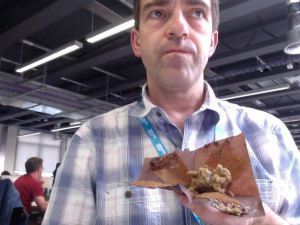
Note to self: don’t buy muffins.
Another evening in the adjoining room while the Olympics played out in earshot. I sense that for Team GB, the Games are sort of over. They’ve certainly peaked. I’m no expert, but I think “we” failed to win any sort of medal today. No golds, at any rate. This is the downside to achieving so much more than anyone realistically expected. You have to readjust to real life afterwards, where there is no podium for you to “podium” on, no medals to “medal”, no similar nouns to “noun” into a verb.

Anyway, I watched another Michael Haneke film on DVD from my big box of foreign-language DVDs: The Piano Teacher. (You don’t know this, as I wasn’t writing a diary last week, but I plucked Haneke’s Code Unknown from the box and thoroughly enjoyed that, hence the yen for some more.) It’s a brilliant but disturbing experience. Isabelle Huppert is, as every awards committe on the planet seemed to spot at the time, superb in it. Brave and subtle and, hey, she can even play the piano really well. It was, I’m guessing, a very different experience to the one on offer in the living room, which seemed to be all about BMX bikes, then hurdling. (I had planned to break off from Haneke to watch Usain Bolt in a final of something at 20.55, but I had misread the RT supplement – it’s on tomorrow at 20.55. This is just as well; you can’t break off from Haneke.)
Oh, and I announced on Twitter, pointlessly, that I was about to watch The Piano Teacher and one joker responded, “dirty old man.” Yes, because what better film to watch if you are a dirty old man? I’m not sure I can think of a less arousing film. Unless you are turned on by Schubert and razor blades.

August 7, 2012
Writer’s blog: Tuesday
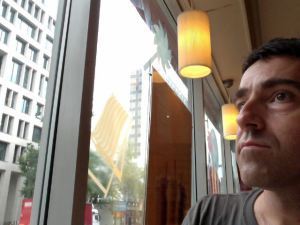 Day Two
Day Two
Seemed to hit a stampede of Olympics people on my Tube journey up to King’s Cross this morning, but I think there may be some kind of road race on in Central London, so it’s to be expected. Frankly, if you commute in London, inhuman mobile squalor is the norm.
Soundtrack to my commute:
THE ORB Toxygene (7″ Edit)
ARCADE FIRE The Suburbs
JESUS & MARY CHAIN Upside Down
KASABIAN Where Did All The Love Go?
ASIAN DUB FOUNDATION Naxalite
TOM WAITS Swordfishtrombones
UNION OF KNIVES Operated On
BATTLE Tendency
COCTEAU TWINS Persephone
ADELE Hometown Glory
FOALS Spanish Sahara
KAREN O & THE KIDS Igloo [partial, as I arrived at the British Library here]
Because the Library’s opening hours have changed during the Games, I accidentally arrived half an hour early this morning and was forced – forced, I tell you – to have a coffee. I knew the Costa in St Pancras Station would be rammed, and the Starbucks (my least favourite of the chains) over the road from the Library has recently been cleverly redesigned so that there’s almost nowhere to sit (good work, everyone), and in any case, the queue was literally out of the door. My only hope without a long walk was the Costa that’s nestled beneath the Premier Inn. I used to frequent this one before I had a Costa loyalty swipe-card and didn’t care that, as a franchise, it didn’t have the technology to top up or take points as payment. So I stopped using it. Funnily enough, they now accept the cards, so I’m 10p closer to a free coffee which I will probably never achieve as Costa don’t have wi-fi, and for a professional writer without an office, this is no good to me. Bet you’re glad I decided to write a daily diary this week.
Here’s news: I watched the whole of the 400m final on the Olympics last night, including the preamble/build-up, and a bit of the debrief, during which John Inverdale almost generalised about black people being better at running, and Michael Johnson took serious-faced issue. (He’s always got a serious face, though, hasn’t he?) It’s a minefield. Ironically, the runners in the 400m final included two very white Belgians, so it was not the time or the place for that dangerous argument. In a Season One episode of Friday Night Lights, the assistant coach made a flippant remark to the press about his black players being natural quarterbacks, implying that they are really good at running fast, like “junkyard dogs”, I think he said. The black players walked out. He was almost sacked. As I say, minefield. Especially when Team GB is so thrillingly mixed up, ethnically: whatever anthropological/geographical point you wish to make, the modern world makes it futile to generalise. It’s like saying men are better at reading maps. It simply can’t be true.

A bit of scandal erupted just before I went to bed (well, it probably erupted way earlier than that, but I was nowhere near a computer): Morrissey had posted an on-tour blog entry on the True To You website, the offending passage of which can – and should – be read in full here. (When I say “should”, you could just ignore him. He is, after all, an attention-seeker with an innate ability to push the right buttons in order be noticed; I am merely adding to his desired chatter by furthering the story’s lifespan.) This time, he’s reacted negatively to British Olympic fervour, wilfully misinterpreted “patriotism” as “jingoism”, and likened the flag-waving quasi-nationalist mood to that of “the spirit of 1939 Germany”. He does not use the N-word, by the way, although it is implied by the year.
I Tweeted before bed that people should read the statement in full before they start calling Morrissey names, rather than pick up soundbites through inevitably skewed news media coverage. Some aimed flack at me as if I were defending him. I wasn’t. I agree with some of what he says, disagree with the way he said some of it, but defend to the death his right to be a dick in public. Events in 1939 in Germany did happen, and we should not be afraid of mentioning that, or the name of the party that Hitler led. But it’s always risky business to compare anything less ethno-genocidal to that infamous period. I doubt that the current “jingoism” going on at Olympic Park and in living rooms up and down the land will result in David Cameron annexing any countries or rounding up any ethnic groups (as much as, in his dreams, he might like to – well, round up the poor, the disabled and the dispossessed, at the very least). Mind you, nor does Moz think that.
I caught up with the reaction this morning, and much of it was antagonistic. It seemed important to some detractors to object not only to what he said, but to how good or not he is at singing. (Typical of this: “Morrissey remains a pillock who hasn’t been musically relevant since The Smiths split.”) It’s a pity he feels the need to dress up what might be taken as valid points – such as the one about the way a population is controlled by promotion of brands, including the Royals and the Beckhams – with bald shock tactics, but hey, who’d notice otherwise? (Having, in the past, written things that have enraged, I know how bruising it is to mess with a consensus, but I operate on a very modest scale to Morrissey and his thousands of devoted disciples, and I seriously do not set out to shock.)
Incidentally, I don’t think the news media is that bothered about the story. It was on Sky News, and their website (note: helpful use of word “Nazi” – in quote marks – in the headline), but it’s nowhere to be seen on the BBC News site, nor in my morning paper. Maybe it will stay that way.
Had a massive rethink about the script that I wrote yesterday, and I’m about to tear it up and start again. Wish me luck.

So, many hours have passed since the last paragraph. I really did it. I really did tear up much of what I wrote yesterday. This is partly because I’d written 15 pages and hadn’t got anywhere near the halfway point in the story. So major surgery was required. I hacked it back to the first scene, and went off in a different direction. It really helped to clear my block. Again, I have no idea if it’s “any good”, what I’ve been writing since about 11am (four hours with a couple of screen-breaks to read the new Sight & Sound), but I’m certainly getting on top of the story beats this time. I realise all of this would be a lot more interesting if you knew what I was writing, and for which channel, but you know the rules. I think I wrote a good joke about a font, and it’s not every day you can do that.
Packed lunch: same chilli as yesterday. No complaints from me. I brought two of the homemade almond/dried fruit/espresso biscotti I made on Sunday, which have come out rather well, but they are exclusively for dunking in a coffee, and I am denying money to the Peyton & Byrne cafe in the Library at this particular junction by drinking their free tapwater. The biscotti can, in this instance, come home with me and be dunked in a non-machine-made coffee in front of the telly. I made 28 individual biscuits, and intend to eat no more than two a day. I’m disciplined like that. I would have made a good monk.
Talking of which, I realised today that I am too much of an idealist. I’m afraid I found myself genuinely shocked by reports that the Church of England is selling its £1.9m stake in News Corp, as a protest against its lack of contrition over phone-hacking. The Church? Shares? In News Corp? A helpful man on Twitter called Paul Harrison furnished me with the info that the Church of England costs £1bn per annum to run, of which three quarters is covered by fundraising and donations, with the shortfall plugged by the stock market. This still shocks me a bit. I must have really thought that churches were funded via the collection plate. What a quaint, unspoiled, John Major-like picture of England I must cling to!

That’s a little picture to remind me of Edinburgh. I always miss the Edinburgh Fringe when I’m not there, and I’m not there, while a large percentage of the people I follow on Twitter are. I’m happy to say that I shall be working at the Media Guardian Edinburgh International Television Festival – or MGEITF as all the cool delegates are calling it – which happens between August 23-25. This coincides with the Fringe, so even though I will be hosting screenings and Q&As during the day (with the stellar likes of Charlie Brooker, Steven Moffat, Victoria Wood, Frank Spotnitz, Simon Bird and Robert Popper), I should be able to see at least a handful of shows in the evenings. I expect these will be shows by my friends, as I won’t have time to experiment. I am sad that I’ll be working when Richard Herring’s Edinburgh Podcast show is on, as I’m sure he’d be enthusiastic about having me on as a special guest!
Oh, I was quoted on Channel 4 News about the Morrissey sedition. Not the programme, the website, but it was an honour anyway, as they are the best news programme. You can read the report here. (Thanks to Anna for asking and catching me at a good moment.) Incidentally, I was asked to be on the Today programme this morning, but I had to say no, as my head’s mashed enough as it is with this script without having to get up early and think hard enough about war films to sound erudite and informed on a programme as important as Today. (I turn down a lot of chances to be on things, you know. I’m not quite the egomaniac you think I am.)
I packed up at 5.30 at the Library, happy with my progress, in that I’m at about the same point in word-length as I was yesterday, but much closer to where I need to be with the story.

My Olympics displacement this evening came courtesy of a very early screening for Beasts Of The Southern Wild, a lowish-budget American directorial debut set on the coast of Louisiana that’s best described as a lyrical subsistence fable from the edge of urban living, starring two non-actors, one of them six, the other a baker from New Orleans. My interest was piqued by David Denby’s rave review in the New Yorker. You can read it in full, if you wish, but personally I’m going to hold back. Why would you want to read a review of a film that’s not out until October? I will say this though: it’s utterly unique, magical, surprising and captivating. I’m saying this now, too: it’s surely an Oscar contender for 2013.
More golds won while I was looking the other way (although Twitter is like a constant commentary, so I don’t feel too out of the loop). If we’re not careful, we’re going to get used to all this winning. We may have to buy back some of our playing fields in order to let future Team GB Olympians play sport on them. You know, the ones both Tory and Labour governments sold off. Bloody disgrace.

Writer’s blog: Monday

This seems like the only way to get me scriptwriting: prosewriting. Or diarywriting. The last time I wrote a daily blog, or diary, was for five consecutive weekdays in March 2011. It was a social experiment, really, as I have neither the time nor the inclination to write at a prescribed frequency – in any case, that would take the fun out of it. I blog when time and inclination align, which is not every day, and is sometimes only once a week.
I’m giving it another crack this week because I’m hoping it will get my scriptwriting juices flowing. I can’t reveal anything about either script I am currently writing, as I fear the jinx, and anyway, it would be unprofessional.
Day One
Last week I believed the hype and stayed away from London, even though I live in London. This was Boris Johnson’s doing. He personally ordered all Londoners to avoid London during the Olympics, and at the nadir of this Soviet-style propaganda campaign, his comedic voice could actually be heard coming out of the public address system of stations on the London underground and overground networks, warning us not to travel during the Games.
So, for the whole of last week, I worked from coffee establishments near to my home. And went home for my lunch. It was OK. I got a lot of writing done for future editions of Radio Times, which was more urgent than either script, so that was fine. The Guardian decided to wait until Wednesday before informing me that they were giving me two weeks off Telly Addict, by which time I’d already spent a couple of hours selecting clips for what would have been Friday’s. Luckily, I hadn’t started the script. If I’m honest, it’s a relief to get two weeks off, having done Telly Addict every week of my life, except one, since April 2011. (Usual self-employed turbine: don’t work, don’t get paid, don’t eat.)
I kept reading in the papers that Central London had in fact become a “ghost town”. So, having failed to write anything meaningful on Thursday or Friday, I decided to get back to normal, brave public transport, and do a week at my “office”, the British Library, which is where I am now. (The Library Tweeted last week that it was awfully quiet here. And it is quieter than usual. But not empty. And anyway, it’s a library, it’s supposed to be quiet, even when it’s full to the seams.) I’m glad to be here.
For the record, these are the songs that soundtracked my commute in.
A PLACE TO BURY STRANGERS Onwards To The Wall
MASSIVE ATTACK Ft. HOPE SANDOVAL Paradise Circus
THE PHARCYDE Passin’ Me By
LL COOL J Pink Cookies
BINARY The Prisoner
FOSTER THE PEOPLE Pumped Up Kicks
LANA DEL RAY Radio
GRACE/PLANET PERFECTO Not Over Yet 99
M WARD Ft. ZOOEY DESCHANEL Rave On
THE BEASTIE BOYS Rhyme The Rhyme Well
BOMBAY BICYCLE CLUB Shuffle (partial: arrived at Library mid-song)
Not sure how interesting that is, but Samuel Pepys only wrote about going out for dinner and then going to bed and he’s the most famous diarist in the world.
Anyway, boring day ahead – for you – as I will be sat here, in reading room Humanities 1, with a break for my packed lunch, all day. Will check back in later. And you’re not allowed to take photos in the reading rooms of the British Library so I used one of me sitting in another building that’s strip-lit.
Progress report: some words written. In an attempt to psychologically kickstart my script, I decided to scrap what I’d written so far, even though I liked it, and even though I’ve been honing the first scene, because I suspect that “honing” has been a displacement activity, which was preventing me from “writing the next scene” (apologies for the writer’s jargon). Anyway, since starting again, I have reached scene three. This can’t be interesting, but there it is. I’m way too close to it to know whether the new scenes are funny enough in terms of comedy or efficient enough in terms of story yet. That’s why I’m having a break to eat my packed lunch in the cafeteria, where, unlike the vast reading rooms, there is noise, even during the so-called “quiet” fortnight of the Olympics. (One thing I love about the British Library, which I also love about London generally, is that you are always in the middle of a maelstrom of different accents and languages. I would miss this if I lived in the middle of nowhere, as I am sometimes romantically drawn to dreaming about.)
I have not been able to access Twitter for most of the day, which has been a blessing. And I have not checked any news feeds, so I have no idea if medals have been won or not. I learned before Twitter went down that Louise Mensch has resigned in order to spend more time with her family in New York and that the Americans have put a robot on Mars. (Maybe Twitter didn’t go down*; the British Library wi-fi has been playing me up all day, too, which has at least provided a bit of friction for my creative mind.)
*Twitter clearly didn’t go down. God bless the BL wi-fi. It helped immeasurably.
Packed lunch: homemade chilli, naturally. Pretty good, if I may say so. The addition of garam masala to my trademark coriander seeds/cumin/mustard seeds/fennel seeds mix made it interesting. I shall be eating this again tomorrow, and the next day, and the next day, so won’t mention it again.

I am avoiding the rush hour on a train. Loads of extra Olympics-looking people, lots of families, which is nice, and people genuinely caped in Union flags, which is astonishing, but not enough of them to prevent me from going about my business. (Enough to prevent me from walking up escalators by standing on the left, but it is ever thus in a city full of visitors.)
I have decided to avoid Olympics coverage for the early part of the evening by going to see a new Hong Kong film called A Simple Life at the cinema. I think the Olympic flame will stay lit without me fanning it. For the record, I was in the next room when Saturday’s historic Team GB victories were achieved, so I heard it, as it happened, and was very pleased for everybody involved and I appreciate what it means for sport and for the national mood, but I am not hooked by the Olympics. I actually find it all a bit overwhelming; so many events, so many heats, so many teams, so many interviews with puffed-out athletes after winning or not winning, so much cheering.
I saw the start of the marathon yesterday morning, and heard a commentator say that perhaps the crowds who’d so valiantly and noisily lined the rain-lashed streets of Central London should hold back on the cheering a bit, as they still had another two and a half hours to go. I Iiked the patrician practicality of his advice, but I suspect they did not heed it. These games started with cheering, and they will end with cheering, and inbetween there will have been cheering. It is impossible to be cynical about it. The sport and the people have roundly beaten the sponsors and the politicians, and that’s a result I can get behind. From the next room.

A Simple Life was a lovely film; moving and very sad. Ready-garlanded with awards – particularly in China and Hong Kong, but also honoured at Venice – I won’t go into too much detail about its plot. Based on the experiences of one of its producers, and directed by Ann Hui (whose past work I do not know), it’s basically about a movie producer (Andy Lau) whose family servant (Deanie Ip) needs looking after in her autumn years, which he selflessly sets out to do. Perhaps too long at two hours, it was nonetheless gentle and occasionally funny amid the sadness, and showed a slice of modern Hong Kong life. And, like so many films from China and Hong Kong, it was full of food and eating.

August 6, 2012
Archive fun: Bilko

Because I am currently suffering a quite debilitating bout of writer’s block – or is it writers’ block, as we all get it? – specifically, unable to write a decent page of script when I am currently trying to write a decent script, I find myself scanning my own written archive. Displacement activity, chiefly, although when the words won’t come, it’s useful to remind oneself that words did come. I woke up this morning, this morning being Monday, the first working day of the working week, in a bit of a panic, and once I opened my laptop, instead of opening the document I’m supposed to be writing, and writing in it, I idled around my blog archive. I read, in full, the piece I wrote about Quentin Letts and squirrels in July 2010, and thought it was pretty well written. You can still read it. (And in fact, some of you are, as it’s always somewhere in the Top 20 of most read blog posts, which is why I happened upon it this morning.)
It’s not going to help me write a script, as it isn’t in script form, but it at least reassures me at a sensitive, self-conscious time, that I can, if the stars are correctly aligned, string a sentence together. The killing joke is: nobody commissioned me to write about Quentin Letts, and I was not paid for writing it. You can’t make a living writing for nothing. But writing for nothing can set you free as a writer. Maybe I should imagine that the script I am writing, or not writing, is actually for this blog and that it doesn’t matter what it’s like. Maybe it’ll get written that way. (That said, a deadline is a surefire muse. Unfortunately, the script I am writing, or not writing, does not have a distinct deadline. The sooner I write and deliver it, though, the better.)
Anyway, before I do something useful towards my professional goal, having already written some words this morning – ie. that preamble – I was contacted by a man called Steve Everitt on Twitter last night asking me if I had the “clout” to get the BBC to show Bilko. (Steve really likes Bilko, only one season of which is even available on DVD, apparently. He is co-founder, writer and researcher at The British Phil Silvers Appreciation Society, launched in 1985 “with Mr Silvers’ full blessing” – it’s here.) I don’t have any such clout, sadly. But the brief Twitter exchange reminded me how much I used to love Bilko as a kid. I loved the characters, and without really knowing much about it, I guess I must have loved the scripts, without which my favourite characters would have been mute.
I felt sure I had written something about Bilko at one point, so I searched my entire writing archive, which goes all the way back to 1996 (anything to not have to write that script, or to not have to not be able to write that script), and I found this short, 650-word column.

It was written for Front Row on Radio 4 in September 2005, which means I will have read it out in a studio at Broadcasting House, and it will have been transmitted on Radio 4. I reprint it here, because otherwise, it will not exist outside of my swollen archive. I might reprint a few other things here, too. Why the hell not? Get them out there. This “column”, as they’re quaintly called in radio, is not a classic piece of writing, but it’s succinct, and, hey, it’s about great scriptwriting. So it might help.
BILKO by Andrew Collins
The first TV programme I ever saw in colour was the Hanna-Barbera cartoon Top Cat. For an eight-year-old, it was a near-hallucinogenic experience. Top Cat himself was yellow. Benny was blue. Choo Choo was pink! What a brave new world these cats represented.
But the move to colour was only partial. Many shows in the early 70s – made before the VHF-to-UHF revolution – remained black and white. One of them was the grown-up live-action sitcom The Phil Silvers Show, upon which Top Cat was unofficially modelled, and which nobody called The Phil Silvers Show, not even Phil Silvers. Bilko is what they called it.
The joy of growing up in that era is that in television terms there was no apartheid between black-and-white and colour. I didn’t care whether programmes were old or new, imported or homegrown. I only cared whether I liked them or not. Bilko was already about 15 years old when I first saw it, its 140-or-so episodes having been made between 1955 and 1959. I didn’t care. I liked them. I liked them, aged 8, because they were funny.
I like them today, aged 40, because they represent a golden age of US sitcom when the great stars of burlesque and vaudeville still dominated with their fast patter and their schtick, and when writers were all schooled in radio, where dialogue was king and, as the stage stars’ material was eaten up by the voracious new medium, they had to supply new stuff by the yard, making for a dynamic combination of comic timing and finely tuned scripts. I also like them because they’re funny.
Master Sergeant Ernie G Bilko, skiving leader of the motor-pool platoon at Fort Baxter in Roseville, Kansas, is not just one of the greatest creations of TV comedy, he’s one of the greatest creations of TV. All bluff and bluster, c’mon-c’mon and hut-hut-hut, his one aim in life is to skew the graph between income and effort – despite the show being originally called You’ll Never Get Rich. He disproves this mainly by playing poker; gambling on, say, how many times a visiting lecturer will twitch during a lecture; and conning people, using not just sleight of hand but sleight of personality.
While the great characters of British sitcom – Hancock, Mainwaring, Steptoe, Fawlty, Trotter, Brent – are losers or at best middle managers, Bilko is a winner. He is the confidence of the “no second class citizens” Eisenhower era on legs. In the course of a typical episode, he starts in the middle, aims for the top, falls to the bottom, then claws his way back to just above the middle. Like his doppelganger Top Cat, [sings] he’s the indisputable leader of the gang – he’s the boss, he’s the VIP, he’s a championship – anyway …
Bilko would, of course, be nothing without two men. Phil Silvers, whose charismatic, spin-bowling performance is the engine of the show. You may have your favourite supporting characters – Doberman, Paparrelli, even Colonel Hall – but they’re just cogs without the lubricant applied by creator Nat Hiken, who wrote or co-wrote the first 71 episodes before bailing out, knackered. They say his scripts were twice as long as the average sitcom, so fast was the delivery. His command of multiple storylines makes him the father of Seinfeld and Curb Your Enthusiasm.
The highest compliment to Bilko came in 1956, when the Pentagon stepped in and forced CBS to alter the “fruit salad” of medals on Bilko’s conniving breast. They urged the removal of two Purple Hearts and three World War 2 Victory ribbons.
But even stripped of his gongs, beaten to 32nd place in Channel 4’s 100 Greatest TV Characters by Miss Piggy, and criminally unavailable here on DVD, he’s the chief, he’s the king, but above everything, he’s the most tip top, top cat.

August 4, 2012
Aaron’s talkin’

I heart Aaron Sorkin. I know he’s had his ups and downs. And some feel he’s consistently failed to beat The West Wing in the years since he left the show that sealed his legend. Certainly, his most celebrated works post-West Wing have been movies: his Oscar-winning screenplay for The Social Network, and his Oscar-nominated decisive final draft of Moneyball. But those who felt that TV had lost him to Hollywood – or lost him back to Hollywood, as that’s where he learned his licks after a foundation in theatre – were wrong, and HBO’s The Newsroom was breathlessly anticipated, not least in my house. Many felt he had something to prove. I didn’t. But they did.
I say: if Sorkin had just written The West Wing – or to be specific, the first four seasons, which is 88 episodes, by the way – he’d have a seat for life at the top table of all great screenwriters for either of the two main types of screen. Some consider its follow-up Studio 60 On The Sunset Strip to have been a “down” for Sorkin, as it was cancelled by NBC and lost a lot of viewers, but for me it had merit. An heroic failure, maybe. Even more critics consider The Newsroom to be a “down”; it’s certainly had a lot of flack in the US.
As a Sorkin groupie, I tried harder than most American critics to love The Newsroom, which was easy enough for the pilot episode, but more difficult for Episode 2. But Episode 3, The 112th Congress, rewarded me for my loyalty and my patience (I’m calling it “the Network episode”), and Episode 4, I’ll Try To Fix You (and yes, it is named after the line in the Coldplay song), which I watched on Thursday night after the Olympics had finished (the Olympics never finishes), took the show up to where I think it belongs. I’m saying nothing about the plot, as many of you won’t be able to watch this legally until it comes out on DVD, or may have taped it, but suffice to say, it built up to an amazing climax, built around Fix You. It danced close to schmaltz, but trod on no toe, and my heart was in my mouth.
What I’m saying is: if you gave The Newsroom a look and bailed before Episode 3, bail back in. Loving Aaron Sorkin has never been a walk in the park. You have to strap in.
Because The Newsroom‘s initial reviews were lukewarm at best, lukecold at worst, HBO has since been accused of “creativity” with the quotes it plastered across print ads for the show. For instance, the critic from Salon, Willa Paskin, was quoted as having hailed The Newsroom as “captivating, riveting, rousing,” when in fact she actually said, “The results are a captivating, riveting, rousing, condescending, smug, infuriating mixture, a potent potion that advertises itself as intelligence-enhancing but is actually just crazy-making.” Naughty.
I am a writer. I started out writing prose journalism. (Actually, I wrote, or co-wrote, two amateur stage plays before I got my first job in journalism.) For the last 15 years I have written scripts. I’m currently writing two scripts, both pilots, in development. The first of the two is not going at all well. The second is going better, but negativity from the first infected the second this week, and I found myself blocked. There are many ways to clear writer’s block. One of them is to watch other scripts that have been made, in order to inspire you. I watched The Newsroom Episode 4 on Thursday, after a very frustrating day’s writing (or not writing), and it did inspire me. Oddly, it also reminded me that I’m never going to write anything as good as The Newsroom Episode 4. (It should be stated that Sorkin wrote the first episodes of the first season by himself. There are other writers on the team – most of whom were let go at the end of the first season in a night of the long typewriter ribbons – but Sorkin still writes alone.)
The scripts I am writing are comedies. They are not The Newsroom. But The Newsroom is comedic. Aaron Sorkin is a writer of drama – talky drama – that finds natural humour in the cadences of speech. Much of his dialogue is banal. And yet, once it’s stacked up into conversations that, for me, recall the best of screwball comedy (a form at which the Americans reign supreme), it flies. It is airborne. There is much to learn from Sorkin, as a comedy writer. In Sorkin, a punchline doesn’t have to be a joke, it just has to be the last line in an exchange.
I also watch Veep, currently, as inspiration for writing my own comedy. Although it also comes from the HBO stable of overt, cocky smartitude, it is British-written – in fact, often by people I know – and it, too, gives confidence, despite being skyscrapingly brilliant. It’s also screwball, without the portent of The Newsroom’s one-hour running time, or the portent of The Newsroom’s brief. It’s good to aspire, I find, no matter how ludicrous that aspiration.
Sorkin does not just use mundane office conversation as a Trojan horse for melodramatic, political or narrative impact. Sometimes, he just writes a Big Speech, and gives it to one of his principal characters. In The West Wing, most of the White House staffers spoke in speeches. Not everybody does in The Newsroom. But Will McAvoy (Jeff Daniels, once Dumb and Dumber, now Clever and Cleverer) does, all the time. He began the season with a Big Speech. I’d like to reprint it, in full. This kind of TV writing should either inspire you to greatness or retirement. (I’m currently wavering between those two impostors, and treating them just the same.)
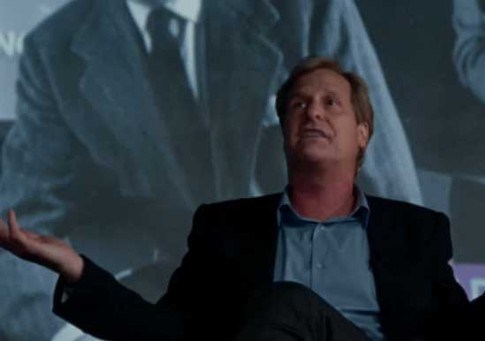
McAvoy is on a panel at a university between a left winger and a right winger. He is unengaged by the debate. A student steps up to the mic during the Q&A and asks what makes America the world’s greatest country. The panel moderator keeps needling him for a proper answer to the question, which he is avoiding. Will states, “It’s not the greatest country in the world, professor, that’s my answer.” Pushed further, he dismisses the liberal (“Sharon, the NEA is a loser. Yeah, it accounts for a penny out of our paychecks, but he [gesturing to the conservative panelist] gets to hit you with it anytime he wants. It doesn’t cost money, it costs votes. It costs airtime and column inches. You know why people don’t like liberals? Because they lose. If liberals are so fuckin’ smart, how come they lose so GODDAM ALWAYS!”); then he dismisses the conservative: “And with a straight face, you’re going to tell students that America’s so starspangled awesome that we’re the only ones in the world who have freedom? Canada has freedom, Japan has freedom, the UK, France, Italy, Germany, Spain, Australia, Belgium has freedom. Two hundred seven sovereign states in the world, like 180 of them have freedom.” And then hell is unleashed. Ready?
And you – sorority girl – yeah – just in case you accidentally wander into a voting booth one day, there are some things you should know, and one of them is that there is absolutely no evidence to support the statement that we’re the greatest country in the world. We’re seventh in literacy, 27th in math, 22nd in science, 49th in life expectancy, 178th in infant mortality, third in median household income, number four in labor force, and number four in exports. We lead the world in only three categories: number of incarcerated citizens per capita, number of adults who believe angels are real, and defense spending, where we spend more than the next 26 countries combined, 25 of whom are allies. None of this is the fault of a 20-year-old college student, but you, nonetheless, are without a doubt, a member of the WORST-period-GENERATION-period-EVER-period, so when you ask what makes us the greatest country in the world, I don’t know what the fuck you’re talking about?! Yosemite?!!!
We sure used to be. We stood up for what was right! We fought for moral reasons, we passed and struck down laws for moral reasons. We waged wars on poverty, not poor people. We sacrificed, we cared about our neighbors, we put our money where our mouths were, and we never beat our chest. We built great big things, made ungodly technological advances, explored the universe, cured diseases, and cultivated the world’s greatest artists and the world’s greatest economy. We reached for the stars, and we acted like men. We aspired to intelligence; we didn’t belittle it; it didn’t make us feel inferior. We didn’t identify ourselves by who we voted for in the last election, and we didn’t scare so easy. And we were able to be all these things and do all these things because we were informed. By great men, men who were revered. The first step in solving any problem is recognizing there is one—America is not the greatest country in the world anymore.
Actually, the second movement is less important than the first, but I reprint both because I might wish to come back and read that again.

Aaron Sorkin is not everybody’s cup of tea. The Newsroom is clearly not everybody’s cup of tea. Some people don’t like tea. Some people have a far lower threshold for liberal American speechmaking than I. Some people may not like the patter of His Girl Friday or The Philadelphia Story or Mr Smith Goes To Washington – written, respectively, by Charles Lederer, Ben Hecht and Charles MacArthur; Donald Ogden Stewart, Waldo Salt and Philip Barry; and Sidney Buchman – while I lap it up, like tea. Some people might prefer their drama to have action in it, rather than conversation. But conversation is action in Aaron Sorkin.
Did I mention that I heart him?

Andrew Collins's Blog
- Andrew Collins's profile
- 8 followers



